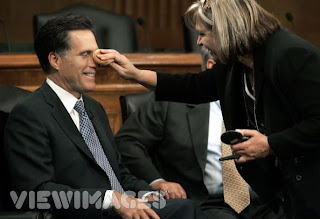
I've compiled the following headlines to show how ridiculous an idea it is to forecast recessions and stock market crashes and economic booms. The stock market is really like playing the slots at a casino. It's a gamble. Yet only god knows why we put so much faith in this insanely volatile creature we call the "free market". If anything, this whole "we're plunging into a recession" fear shows how the so-called "invisible hand" suffers from a severe case of arthritis and random muscle spasms.
Also, Check out the video at the following link too... (in which Leo Panitch also confirms this and questions why there is so much fearmongering about the apocalyptic recession):
CLICK HERE
As you can see from the headlines below, the mainstream thought on the economy went from total confidence (including in the sub-prime mortgage sector) to fears of a recession, to massive stock market losses, only to be followed by "remarkable" recoveries, and confidence yet again... it's crazy!
October 4th (2007): No U.S. Recession in the Cards: Forecasters
The United States should avoid a recession and Canada's economy will likely escape without major problems from the sub-prime mortgage storm, two economic forecasters said Thursday.
January 9th (2008): No Recession in Canada, Bank Economists Say
Canada's economic growth will slow down this year, but will avoid a recession, top economists at Canada's biggest banks agreed Wednesday.
January 21st (2008): TSX Joins Global Market Rout: Toronto Market Takes Biggest 1-day Drop in 7 Years
The S&P/TSX composite index plummeted almost 605 points on Monday as it joined a worldwide market sell-off prompted by growing fears of a U.S. recession.
January 22nd (2008): TSX Bounces Back with 509-point gain
The Toronto stock market staged a dramatic rebound Tuesday as an emergency rate cut from the U.S. Federal Reserve and a smaller cut by the Bank of Canada persuaded investors to wade back into the market following a five-day tumble.
January 22nd (2008): Asian Stock Markets Plunge Amid Fears of US Recession
Global stock markets extended their shakeout into a second day Tuesday, plunging amid fears that a possible U.S. recession will cause a worldwide economic slowdown.
January 23rd (2008): US economy in recession: BMO Capital Markets
The US economy is in a recession, BMO Capital Markets said Wednesday as
it lowered its growth forecasts for both the US and Canada.
January 23rd (2008): Soros Says US Recession is Likely
The billionaire investor George Soros has said it will be "very difficult to avoid" recessions in the US and the UK.
January 23rd (2008): Some Sectors, Economists Say Doom and Gloom Exaggerated
The blood is on the floor of the world's stock exchanges and Canadian investors are nervous about the future, but you wouldn't know it from the people who help run Canada's construction industry, one of the healthiest sectors of the economy.
January 24th (2008): Bank Warns of Tougher Times, Cuts Growth Forecast to 1.8% for '08
Canada's economy has hit a wall and is unlikely to recover until the second half of this year due to a global slowdown and a crashing U.S. economy, the Bank of Canada said Thursday.
January 24th (2008): TSX Closes with 250-point Gain; Dow Rises 108
The TSX jumped at the opening of trading Thursday and held those gains through the day as the market built on Wednesday's late-day rally.
January 24th (2008): US Shares Make Stunning Recovery
US shares rebounded on Wednesday on fresh hopes that regulators will steer the US economy out of a recession.
February 13th (2008): U.S. Retail Sales Unexpectedly Rise
U.S. retail sales staged a surprising rebound in January as shoppers ventured back into stores following a dismal December.
![The Organic Intellectual [Tribute to an Idea...]](http://3.bp.blogspot.com/_x1kb2axI1C8/TSy0-RDb4DI/AAAAAAAAAgc/fo-WauH_whc/S980-R/the%2Borganic%2Bintellectual.png)





